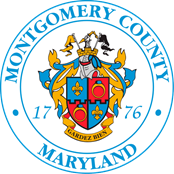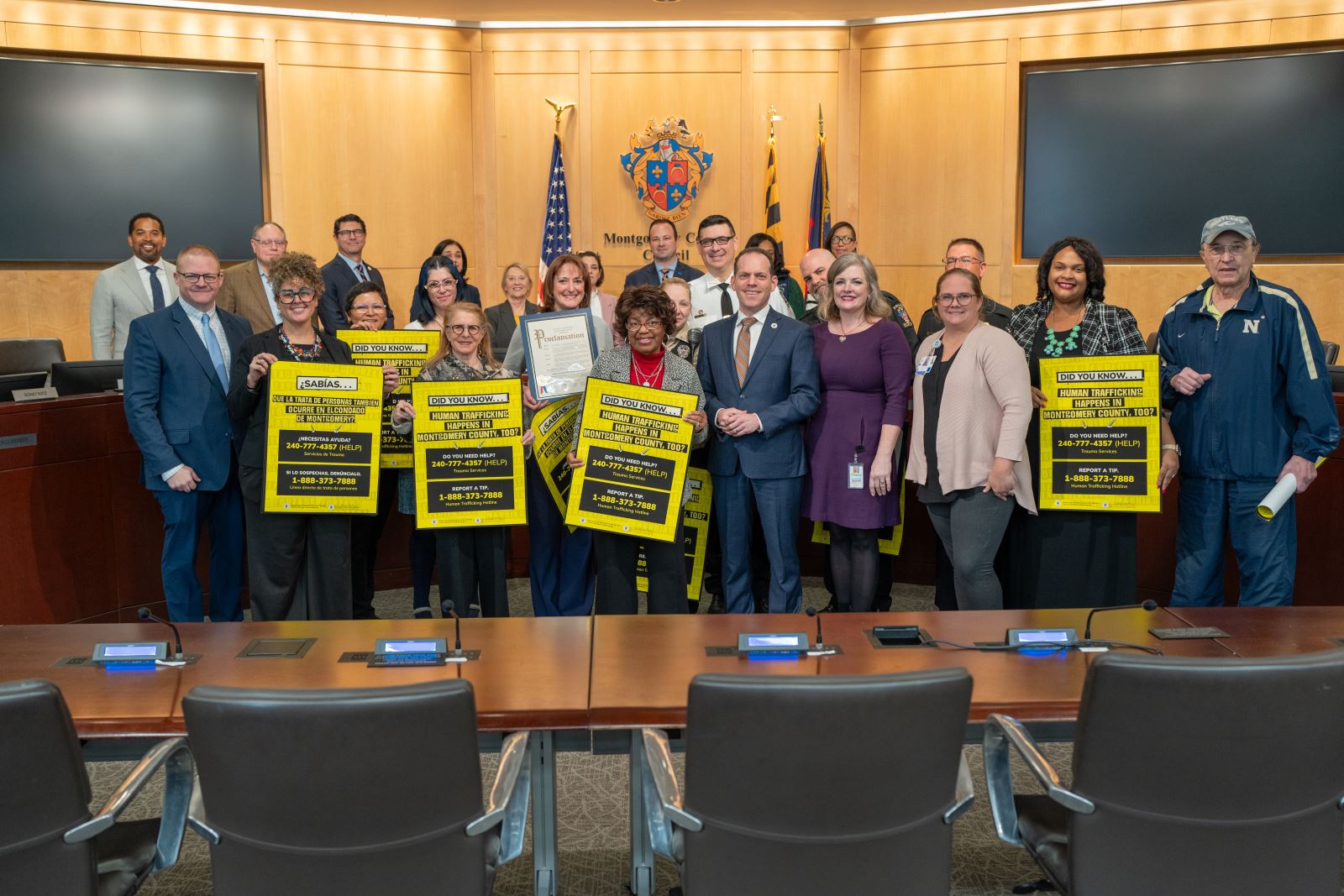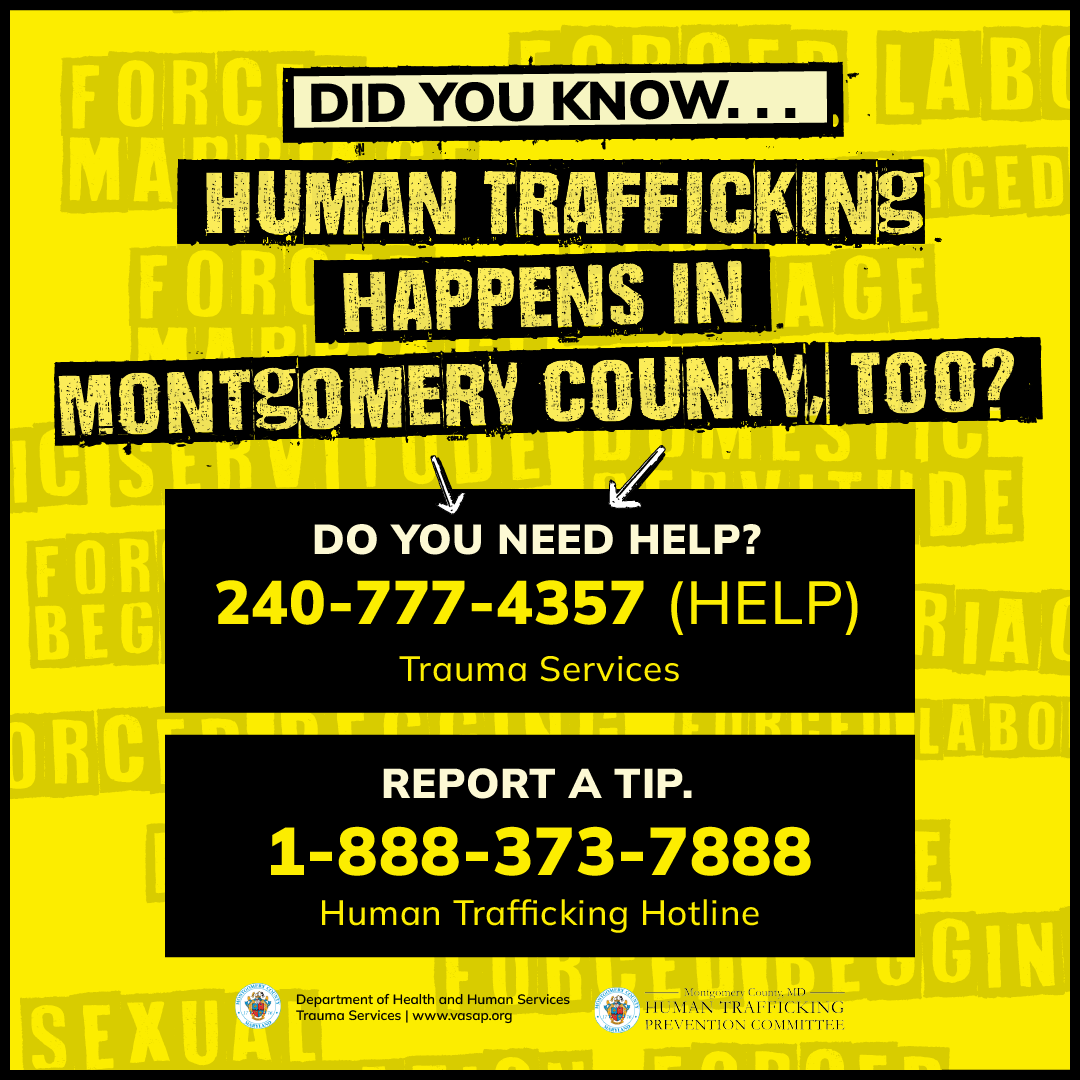Human Trafficking

Montgomery County, MD
Human Trafficking Prevention Committee

Human trafficking has long been an issue in Montgomery County, in Maryland, nationally and internationally. Human trafficking is a form of modern slavery where people profit from the control and exploitation of others (Polaris Project). There are generally two forms of trafficking: sex and labor. Victims of human trafficking include men, women, boys and girls.
The Polaris Project, a national non-profit that assists human trafficking victims, does an excellent job of collecting statistics by state. Maryland data may be found here (PDF).
In 2014, County Executive Ike Leggett created the Montgomery County Human Trafficking Task Force. The purpose of the task force is to increase understanding of the issue in Montgomery County and to develop interagency coordination of strategies for response and prevention.
In October 2017, the task force transitioned into the Montgomery County Human Trafficking Prevention Committee (Committee) via 27-17 Human Rights and Civil Liberties—Human Trafficking Prevention Committee Established.
Full Committee Meeting Dates
Meetings are held on the third Wednesday, every other month.
- Wednesday, November 20, 2024, 12:00-1:30pm
- Wednesday, January 15, 2025, 12:00-1:30pm
- Wednesday, March 19, 2025, 12:00-1:30 PM
- Wednesday, May 21, 2025, 12:00-1:30 PM
- Wednesday, July 16, 2025, 12:00-1:30 PM
- Wednesday, September 17, 2025, 12:00-1:30 PM
- Wednesday, November 19, 2025, 12:00-1:30 PM
Meetings for the full human trafficking prevention committee are in person, and take place in the second floor meeting room of the Rockville Library. Please note that meeting dates and times are subject to change, so please call or email ahead to confirm
Please email [email protected] or call 240-777-8333.
The Committee’s overarching goals include:
- Increasing the identification and prosecution of all parties supporting the organized crime of human trafficking to include traffickers, suppliers, transporters, advertisers and demand elements;
- Elimination of human trafficking, and
- Improving identification of and services for human trafficking victims
Watch the Task Force's kick-off event (YouTube)
The following organizations are active in reducing and preventing trafficking in Montgomery County:
Request a speaker
Are you looking for a speaker to talk about human trafficking? We have speakers that may be able to attend your event free of charge.
Human Trafficking Speaker RequestSubcommittees
The Human Trafficking Prevention Committee has three subcommittees: Legislative, Education and Outreach, and Victim Services. The subcommittees currently meet virtually on the dates and times listed below.
Please note that meetings are subject to change. Call 240-777-8333 with any questions.
Full committee meetings will be in person in the 2nd floor meeting room of the Rockville Library, 21 Maryland Ave., Suite 330.
All subcommittees use the same Zoom link
Legislative Subcommittee
The legislative committee is responsible for researching best practices within the criminal justice system to combat human trafficking. The committee meets six times a year.
County Bill 9-15 (PDF), Health and Sanitation—Bodywork Establishment—License. The bill was signed into law April 22, 2015. The legislative sub-committee worked with the entire task force to introduce and implement County Bill 9-15. The law is the first of its kind in Maryland, and requires a license to operate a bodywork establishment in the county. Bodyworks establishments are businesses that advertise bodywork services, such as reflexology, acupressure and other practices that fall outside the Maryland State definition of massage, or where any employee, agent or contractor performs bodywork on an individual. The law ensures that legal establishments can operate while providing enforcement against illegal establishments. Licenses are issued through the County’s Department of Health and Human Services (DHHS). Enforcement is done by DHHS and the Montgomery County Police Department.

County Bill 39-15 (PDF) was also established to deter human trafficking in the county. Bill 39-15 makes purchasing prostitution a violation of county law. Although selling or buying prostitution violates the current State Criminal Law prohibiting solicitation of prostitution, Bill 39-15 adds an alternative law enforcement mechanism for the police to combat human trafficking in the County. A person is often forced to work as a prostitute by human traffickers at a young age. The bill authorizes a police officer to issue either a civil or criminal citation to the customer for purchasing prostitution in the county. A civil citation would be prosecuted by the County Attorney's Office and could result in a maximum fine of $500 for a first violation and $750 for subsequent violations. A criminal citation would be prosecuted by the State's Attorney and could result in both a fine up to $1,000 and up to six months in jail. The bill would be enforceable only against the customer. The bill was signed into law on November 25, 2015.
Legislative Subcommittee Meeting Dates
Meetings are held on third Wednesday, every other month.
- Wednesday, December 18, 2024, 1:00-2:30 PM
- Wednesday, February 19, 2025, 1:00-2:30 PM
- Wednesday, April 16, 2025, 1:00-2:30 PM
- Wednesday, June 18, 2025, 1:00-2:30 PM
- Wednesday, August 20, 2025, 1:00-2:30 PM
- Wednesday, October 15, 2025, 1:00-2:30 PM
- Wednesday, December 17, 2025, 1:00-2:30 PM
Education and Outreach Subcommittee
The education and outreach committee is responsible for educating the community about human trafficking. The chair is Wendy Stickle, Director of the University of Maryland Criminology and Criminal Justice Program at the Universities at Shady Grove. Dr. Stickle’s e-mail is: [email protected]Education and Outreach Committee Meeting Dates
Meetings are held on third Wednesday, every other month
- Wednesday, December 18, 2025, 10:00-11:30 AM
- Wednesday, February 19, 2025, 10:00-11:30 AM
- Wednesday, April 16, 2025, 10:00-11:30 AM
- Wednesday, June 18, 2025, 10:00-11:30 AM
- Wednesday, August 20, 2025, 10:00-11:30 AM
- Wednesday, October 15, 2025, 10:00-11:30AM
- Wednesday, December 17, 2025, 10:00-11:30AM
Victim Services Subcommittee
This committee coordinates services for victims in the county.
Victim Services Meeting Dates
Meetings are held on third Wednesday, every other month.
- Wednesday, December 18, 2024, 3:00-4:30 PM
- Wednesday, February 19, 2025, 3:00-4:30 PM
- Wednesday, April 16, 2025, 3:00-4:30 PM
- Wednesday, June 18, 2025, 3:00-4:30 PM
- Wednesday, August 20, 2025, 3:00-4:30 PM
- Wednesday, October 15, 2025, 3:00-4:30 PM
- Wednesday, December 17, 2025, 3:00-4:30 PM
